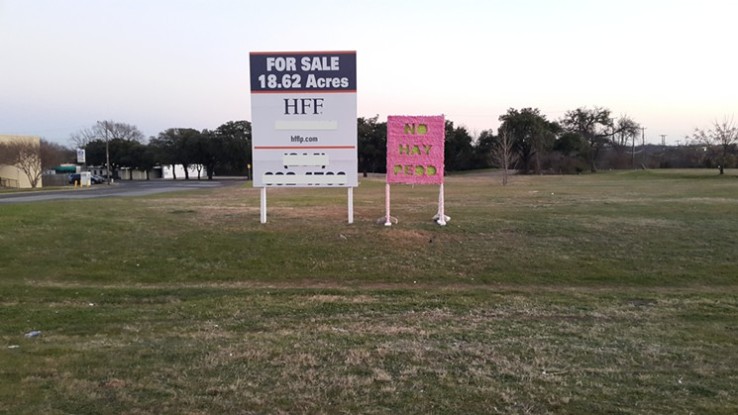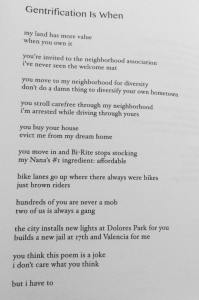more and more, i am tempted to disavow my identification with the creative class. i can’t tell if it’s just a dallas-based discontent, or if it is more far flung, like when i see gentrification apologists being smug on facebook.
in this particular situation, ‘class’ is the operative word. i still remember sitting in on a meeting of a group from CalArts that was working on the topic of MFA debt, in which one of the white male organizers stated quite clearly, “i want to be able to afford to not live in a ‘bad neighborhood’.”
as someone who grew up with parents working in factories, nursing homes, and back-of-house restaurants, the distinction that the creative class makes between itself and the working class/poor (aka the people who live in ‘bad neighborhoods’) makes me twitch. in my experiences with some artist organizing in los angeles and dallas, it seems like the class concern stops at the artist’s well being. as long as artists with MFAs can live in affordable apartments and have steady jobs with benefits, it’s fine. nevermind the fact that the gallery you are about to open is in an area that displaces hundreds of working class families.
in dallas it’s particularly exhausting because very few artists here generate art with political content. it’s one thing to generate art with political content but then not practice that politics in one’s real life. it’s another to be completely disengaged with politics altogether. this lack of critical political thought leads to artists not making the connection between the city’s complicity in evicting renters and its crackdown on art events without a certificate of occupancy. artists are willing to mobilize for the latter, but not for the former, because ultimately the creative class in dallas does not see itself in solidarity with the working class/poor.
when the city of dallas finagles a closed door $15 million bailout of a performing arts center that pays its top executive just shy of half of a million per year and dallas opera is telling you to go shop at versace so that they can get a percentage of the proceeds, the class affiliation of the dallas art scene is seriously, seriously twisted. why does the creative class see themselves in these institutions, and not in the faces of working class families who are most likely closer in income and struggles? is it aspirational? is it the denial of privilege?
i think it’s a difficult pill to swallow for artists to take a step back and say “i’m privileged”. but it’s true. i have to pay my student loans and my health insurance every month, but i have an MFA and a savings account and because of that, i’m one of the most privileged people living in my neighborhood. privilege stops being an indictment when one transforms that privilege into solidarity. that solidarity is what is lacking in creative classes not only in dallas, but nationally.
there are a handful of people in dallas who keep me going, without whom i probably would have given up this place months ago. some of them are artists, but some of them are decidedly not. i’m fighting, but i’m also fighting exhaustion.

 This weekend I will be participating (read: opening my big mouth!) on a
This weekend I will be participating (read: opening my big mouth!) on a 